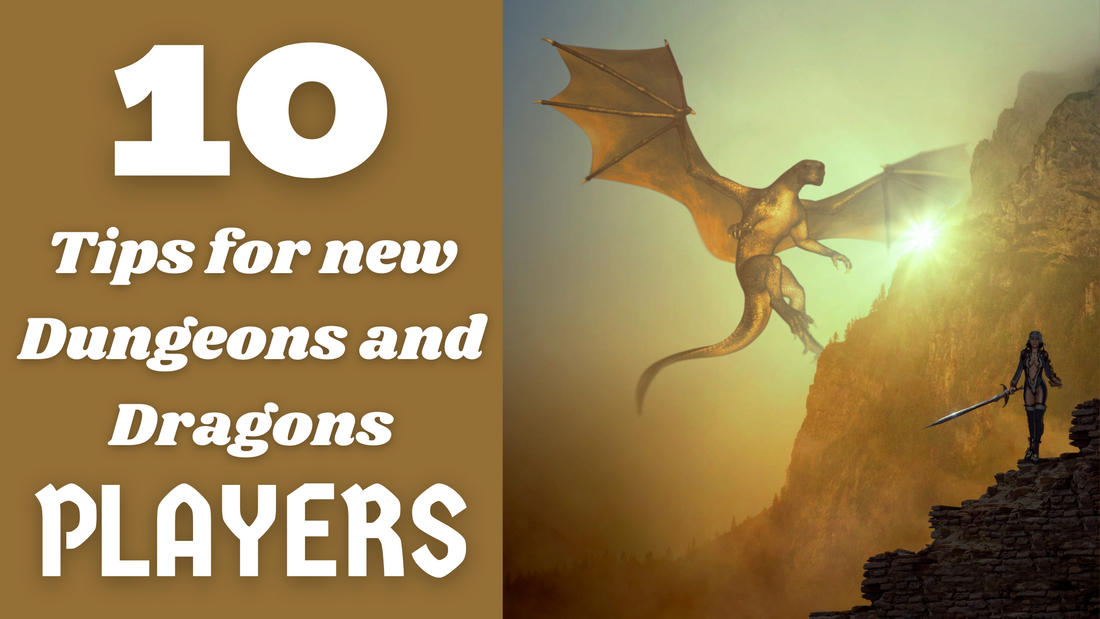
10 Tips for new Dungeons and Dragons Players
You’ve heard the whispers. The dice rolling. The laughter. The dramatic shouting of “I cast Fireball!” followed by some suspiciously smug grins around the table. That, dear reader, is the magic of Dungeons & Dragons.
Whether you're the kind of person who’s always fancied slaying dragons, seducing tavern owners with bardic charm, or just really loves the idea of having a pet owlbear, this beginner’s guide is for you. Let’s unravel the mysteries of D&D together, one d20 at a time.
Here at Goomoo, stories are the bread and butter of everything we do. I’m Jake, lover of worlds, builder of dungeons, and occasional giver of cursed loot. I thrive on creating stories from scratch in games like Dungeons & Dragons.
On the flip side, Becs prefers to dive into tales via books (usually with a blanket, a cuppa, and a suspicious number of snacks). Whether you’re a builder or a browser of stories, D&D lets you step into your own, and it’s an absolute blast
10 Things Every New Dungeons & Dragons Player Should Know
1. What Is Dungeons & Dragons?
Dungeons & Dragons is a tabletop roleplaying game where players create characters and go on adventures together. One player takes the role of the Dungeon Master, or DM, who sets the scene, plays all the non-player characters (NPCs), and acts as the storyteller and rules referee. Everyone else plays as characters in the story, rolling dice to see what happens when they try to do something risky, heroic, or hilarious.
2. What Are All These Dice?
You’ll need a set of seven polyhedral dice, each with a different number of sides. They’re used to decide whether your character succeeds or fails at something, from picking a lock to punching a goblin in the face.
Most of the below are used for damage, however, if creative the Dungeon/Game Master can use them for other things.
Here’s what they look like:
- d20 – The big one with 20 sides, used for most actions and checks
- d12 – 12 sides, used mainly for heavy weapon damage
- d10 – 10 sides, used for higher damage and percentages
- d8 – 8 sides, Normally used for damage and spells
- d6 – 6 sides, The classic MONOPOLY dice, used mainly for damage rolls
- d4 – The little pyramid, great for spells and stepping on with bare feet
- d100 – Usually two d10s rolled together to give a number from 1 to 100, this is for tasks that require a percentage.
🎲 Want to start strong? Grab a Mystery Dice Set and let fate decide your vibe.

3. The Core Stats – What Makes Up a Character?
Every character has six ability scores, which tell you what your character is good (or bad) at. Here’s what they are, and how they might show up in your game:
- Strength – Physical power. You might lift a heavy log to rescue someone or break down a door.
- Dexterity – Agility and reflexes. Think dodging traps, sneaking around, or quick hands in a tavern card game.
- Constitution – Endurance and health. Helps you resist poison, survive harsh conditions, or hold your drink.
- Intelligence – Book smarts and logic. Knowing ancient languages, solving puzzles, or recalling important facts. (Tomato is a fruit.)
- Wisdom – Common sense and perception. Spotting traps, reading body language, or making good decisions. (But it doesn’t go in a fruit salad.)
- Charisma – Charm, presence, and social mojo. Useful for persuading a king, lying to a guard, or being the life of the party.

4. What’s a Character Sheet?
Your character sheet is your adventurer’s résumé. It holds all your stats, abilities, spells, gear, personality, and dreams of one day owning a magical chicken farm. You can write it by hand or use digital tools.
📝 Try the free D&D Beyond Character Builder to make life easier.

5. How Do I Play the Game?
The basic rhythm is simple:
- The DM describes a situation.
- You say what your character does.
- If it could go wrong or has a chance of failure, you roll a d20 and add a relevant modifier.
- The DM sets a Difficulty Class (DC) – if you meet or beat the number, you succeed. If not... well, there’s probably fire involved.
It’s not about getting everything right, it’s about telling an amazing, messy, unpredictable story together.
6. What Do I Need to Start?
To play your first game, you’ll need:
- A character (premade or homebrewed)
- A set of polyhedral dice
- A character sheet
- A pencil (or digital tool)
- The basic rules (they’re free!)
- A Dungeon Master and a few friends
- Snacks (optional, but highly recommended)
📘 Get the official free Basic Rules here
7. Roleplaying – The Heart of D&D
Roleplaying means acting out scenes or describing your character’s actions, voice, or decisions in the moment. It’s one of the foundations of the game and often where the best laughs come from. Some players use voices and accents, others narrate what they’re doing. There’s no “right” way , just have fun and be yourself.
💡 Nervous? No problem! Check out our Top 10 Roleplaying Tips to ease into it.
8. What Are Hit Points?
Hit Points (HP) measure how much damage your character can take before going down. Take a hit, lose some HP. When you hit 0, you fall unconscious and might die unless someone saves you with magic, potions, or a dramatic monologue.
Healing spells, rest, and snacks (magical or otherwise) bring those points back.
9. What Are Classes and Species?
Classes determine your abilities and role – whether you’re blasting spells, wielding swords, or charming your way past every problem. Species (sometimes called races) affect your traits, like movement speed, night vision, or resistance to certain things.
Classes: Fighter, Wizard, Bard, Rogue, Cleric, Ranger, Barbarian
Species: Elf, Dwarf, Dragonborn, Halfling, Tiefling, Human
🧝♂️ Find out more about species here.
⚔️ Find out more about classes here.
To keep it simple, start off with the ones under the Player Handbook PHB.

10. It’s About Fun, Not Perfection
You’ll forget a rule, mix up a spell, or use a healing potion on a ghost. It happens. And that’s the joy of it. The best moments in D&D come from unexpected rolls, weird ideas, and shared laughter. The goal is not to be perfect – it’s to enjoy the story you create together.
Dungeons & Dragons isn’t just a game, it’s a creative playground where dragons can be besties, bards can defeat evil with interpretive dance, and a simple dice roll can change your destiny. Whether you're an introvert looking for escapism or a chaos gremlin looking to cause trouble, there's a seat for you at the table.
🎲 Fancy rolling into your first quest? Grab a Mystery Dice Set from Goomoo, because every adventure begins with a good roll.
From that nerdy kid in school,
-Jake
